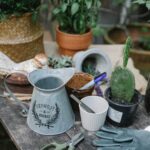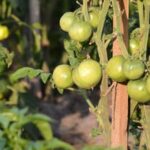When it comes to vegetable container gardening, the soil you use plays a critical role in the success of your plants. The right soil can provide essential nutrients, proper drainage, and a suitable environment for healthy growth. In this article, we will explore the significance of using the right soil in vegetable container gardening and how it contributes to successful harvests.
Container gardening has become increasingly popular due to its numerous benefits. It allows individuals with limited space or poor soil conditions to grow their own vegetables, herbs, and fruits. Additionally, it provides greater control over environmental factors such as sunlight exposure and water drainage. However, to maximize the potential of container gardening, selecting the appropriate soil is crucial for achieving optimal plant growth and yield.
Using the wrong type of soil can lead to various issues such as poor drainage, nutrient deficiencies, and compacted roots. Therefore, understanding the different types of soil available and their properties is essential for creating a favorable environment for your vegetable plants.
In the following sections, we will delve into the basics of container gardening, discuss various soil types, detail ideal soil composition for vegetables, and provide recommendations for choosing the right soil mix. By the end of this article, you will have a comprehensive understanding of how crucial it is to use the right soil in vegetable container gardening for successful growth.
The Basics of Container Gardening
When it comes to vegetable container gardening, choosing the right container is essential for the success of your plants. There are several types of containers, varying in sizes and materials, that can be used to grow vegetables effectively.
Types of Containers
The most common types of containers for vegetable container gardening include plastic pots, ceramic or terracotta pots, fabric grow bags, and wooden or metal containers. Each type has its own benefits and drawbacks, such as durability, insulation, and water retention.
Sizes of Containers
The size of the container depends on the specific vegetable you plan to grow. For example, larger vegetables like tomatoes or peppers require deeper and more spacious containers compared to smaller herbs or lettuces. It’s crucial to consider the mature size of the plant when selecting the container size.
Materials for Containers
Containers can be made from various materials such as plastic, ceramic, fabric, wood, metal, or even recycled materials like buckets or barrels. Each material has different properties in terms of insulation, moisture retention, and aesthetic appeal. It’s important to choose a material that best suits the needs of your specific plants and growing environment.
By understanding the basics of different types of containers and their characteristics in terms of sizes and materials, you can make an informed decision when selecting the right containers for your vegetable container garden. Choosing suitable containers will provide a strong foundation for successful plant growth and a bountiful harvest.
Understanding Soil Types
When it comes to vegetable container gardening, understanding the different types of soil and their properties is essential for successful plant growth. The type of soil used in container gardening can greatly impact the health and productivity of the vegetables being grown.
Topsoil
Topsoil is the uppermost layer of soil, typically rich in organic matter and nutrients. It is commonly used in traditional ground gardening but can also be utilized in container gardening. When using topsoil for container gardening, it’s important to ensure that it is well-draining to prevent waterlogging, which can be detrimental to plant roots.
Potting Mix
Potting mix, also known as potting soil, is specifically formulated for container gardens. It is typically a blend of organic matter, such as peat moss or compost, along with materials like perlite or vermiculite to improve drainage. Potting mix is lightweight and provides good aeration for plant roots, making it an ideal choice for vegetable container gardening.
Compost
Compost is a nutrient-rich soil amendment that consists of decomposed organic matter. It not only improves the structure and fertility of the soil but also enhances its ability to retain moisture. Adding compost to the soil mix in vegetable containers can provide a natural source of nutrients for the plants while promoting overall soil health.
Understanding the properties and characteristics of these different types of soil is crucial in determining the most suitable option for vegetable container gardening. Each type has its own advantages and considerations, and choosing the right one can contribute significantly to the success of your container garden.
Ideal Soil Composition for Vegetables
When it comes to vegetable container gardening, the soil composition plays a vital role in ensuring the successful growth and bountiful harvest of vegetables. The ideal soil for container gardening should be well-draining to prevent waterlogged roots, which can cause plant stress and diseases. It should also retain enough moisture for the plants to thrive. Moreover, the soil needs to provide essential nutrients and maintain an appropriate pH level for optimal plant development.
One of the key components of a successful vegetable container garden soil is organic matter. This helps improve both the drainage and water retention capabilities of the soil, while also providing a steady release of nutrients to nourish the plants. Nutrients are essential for healthy plant growth, and they can be supplied through organic matter or added fertilizers.
Lastly, maintaining the proper pH level is crucial as it affects nutrient availability to plants. Most vegetables prefer slightly acidic soil with a pH range between 6.0 and 7.0.
In summary, creating an ideal soil composition for vegetable container gardening involves incorporating organic matter to improve drainage and nutrient availability, supplying necessary nutrients through organic matter or fertilizers, and ensuring that the soil maintains an appropriate pH level for optimal plant development.
| Soil Component | Importance |
|---|---|
| Organic Matter | Improves drainage and provides nutrients |
| Nutrients | Necessary for healthy plant growth |
| pH Level | Affects nutrient availability to plants |
Choosing the Right Soil Mix
The type of soil used in vegetable container gardening plays a crucial role in the success and overall health of the plants. When it comes to choosing the right soil mix, there are several options available, each with its own unique features and benefits. Pre-made soil mixes are a convenient choice for many gardeners, as they are specifically formulated to provide essential nutrients and promote proper drainage.
One popular option is commercial potting mix, which is lightweight and well-draining, making it suitable for a variety of vegetables. Additionally, there are special blends designed specifically for organic gardening, which can be beneficial for those seeking natural and sustainable options.
For those who prefer a more hands-on approach, creating a custom soil mix allows for greater control over the components used. A basic recipe for a custom vegetable container garden soil mix may include equal parts of peat moss or coconut coir, vermiculite or perlite, and compost. Peat moss helps retain moisture, while vermiculite improves drainage, and compost provides essential nutrients. This combination creates a well-balanced soil mix that promotes healthy root growth and overall plant development.
It’s important to consider the specific needs of the vegetables being grown when choosing or creating a soil mix. Some plants may require better drainage, while others thrive in moisture-retentive soils. Understanding the characteristics of different soils and their impact on plant growth is essential for selecting the most suitable option for successful vegetable container gardening.
| Soil Type | Features |
|---|---|
| Commercial Potting Mix | Lightweight, well-draining |
| Organic Soil Blend | Sustainable choice, natural nutrients |
| Custom Mix (Peat Moss/Coconut Coir + Vermiculite/Perlite + Compost) | Balanced moisture retention and drainage |
Best Practices for Soil Preparation
When preparing the soil for vegetable container gardening, it is essential to follow proper techniques to ensure the best growing conditions for your plants. The following are some best practices for soil preparation that will help set the stage for a successful garden:
- Sterilization: Before planting, it is crucial to sterilize the soil to eliminate any harmful pathogens, weed seeds, or pests that could be present. One effective method of sterilization is solarization, which involves covering the moistened soil with clear plastic for several weeks during hot weather.
- Watering: Proper watering of the soil is vital for the health of your vegetable plants. When preparing the soil, make sure it has adequate moisture without being too wet or too dry. This will create an optimal environment for seed germination and root growth.
- Drainage: Good drainage is essential in container gardening to prevent waterlogging, which can lead to root rot and other issues. Ensure that your chosen containers have drainage holes at the bottom and use a well-draining soil mix to promote proper moisture levels.
Taking these steps during soil preparation will contribute significantly to the overall success of your vegetable container garden. By sterilizing the soil, providing adequate moisture, and ensuring proper drainage, you are setting the foundation for healthy plant growth and a bountiful harvest.
Maintaining Soil Health
Some key methods for maintaining soil health in vegetable container gardening include:
- Regular fertilization: Using organic or synthetic fertilizers to replenish essential nutrients that may be depleted over time.
- Crop rotation: Rotating your vegetable crops in different containers each season can help prevent nutrient depletion and reduce the risk of pest infestations.
- Compost application: Adding compost to the soil helps improve its structure, fertility, and water-holding capacity, providing a steady supply of nutrients to your plants.
Pest control is another crucial aspect of maintaining soil health in container gardening. Pests can not only damage your plants but also disrupt the balance of the soil ecosystem. Some effective pest control methods to consider include:
- Natural predators: Introducing beneficial insects or animals that prey on harmful pests can help keep their populations in check.
- Organic pesticides: Using eco-friendly pest control products made from natural ingredients can effectively manage pest infestations without harming the soil or surrounding environment.
- Regular monitoring: Keeping an eye on your plants for signs of pest damage and taking immediate action when necessary to prevent further infestation.
By implementing these methods for maintaining soil health and controlling pests, you can ensure that your vegetable container garden remains productive and thriving throughout the growing season. Taking proactive measures to care for the soil will also contribute to sustainable gardening practices and long-term success.
Troubleshooting Soil Issues
Addressing soil-related problems is crucial in achieving a successful and bountiful harvest in vegetable container gardening. Common issues that gardeners may encounter include compacted soil, nutrient deficiencies, and pH imbalances. Fortunately, with the right knowledge and techniques, these problems can be addressed effectively.
Compacted soil is a common issue in container gardening, which can hinder root growth and water drainage. To address this problem, loosening the soil using a hand tool or adding organic matter such as compost can help improve the soil structure. Additionally, avoiding overwatering and providing adequate drainage in the containers can prevent compacted soil from occurring.
Nutrient deficiencies can arise when the soil lacks essential elements for plant growth. Regularly testing the soil for nutrient levels and providing the necessary fertilizers or amendments can help maintain proper nutrition for vegetables in container gardens. Adjusting the pH levels of the soil based on specific vegetable requirements can also aid in preventing nutrient deficiencies.
pH imbalances can have detrimental effects on plant health and growth. Testing the pH of the soil regularly and making adjustments using natural additives such as lime or sulfur can help maintain optimal pH levels for vegetable container gardening. It is important to monitor pH levels throughout the growing season as they may fluctuate due to watering and fertilization.
By addressing common soil-related problems such as compacted soil, nutrient deficiencies, and pH imbalances, vegetable container gardeners can ensure healthy plant growth and maximize their harvest. Implementing proper techniques for troubleshooting these issues will contribute to a thriving garden and a successful growing season.
Conclusion
In conclusion, the success of a vegetable container garden heavily relies on the type of soil used. By understanding the basics of container gardening and the different types of soil available, individuals can create an ideal soil composition for their vegetables.
It is crucial to select the right soil mix or create a custom one that provides essential components such as organic matter, nutrients, and suitable pH levels. Proper soil preparation techniques and maintenance practices are also vital in ensuring the health and fertility of the soil throughout the growing season.
Using the right soil in vegetable container gardening not only promotes healthy plant growth but also contributes to a bountiful harvest. By addressing common soil-related problems and troubleshooting issues such as compacted soil, nutrient deficiencies, and pH imbalances, gardeners can overcome challenges that may arise during the growing process. Furthermore, maintaining soil health through regular fertilization and pest control measures will support robust plant growth and maximize crop yield.
In essence, choosing the appropriate soil for vegetable container gardening is paramount for achieving successful results. The investment in high-quality soil and proper care will ultimately lead to a rewarding harvest of fresh, flavorful produce right at one’s doorstep.
Therefore, by following the guidelines outlined in this article and understanding the significance of using the right soil mix, individuals can embark on a fulfilling vegetable container gardening journey with confidence in their ability to nurture thriving plants and enjoy a plentiful harvest.
Frequently Asked Questions
What Soil Is Best for Growing Vegetables in Containers?
The best soil for growing vegetables in containers is a well-draining mix that is rich in organic matter. It should have a good balance of nutrients and be loose enough to allow for proper root development.
Look for a potting mix specifically designed for container gardening, or you can create your own mix using a combination of peat moss, compost, and perlite or vermiculite.
What Is the Best DIY Soil Mix for Container Vegetable Garden?
The best DIY soil mix for a container vegetable garden typically includes equal parts of peat moss, compost, and either perlite or vermiculite. Peat moss provides moisture retention, compost adds nutrients, and perlite or vermiculite improves drainage and aeration. You can also add some garden lime to adjust the pH level if necessary.
What Is the Best Soil for a Vegetable Garden?
The best soil for a traditional vegetable garden is loamy soil that is well-draining yet retains moisture. It should be rich in organic matter and have a balanced pH level, around 6 to 7.
If your soil is deficient in nutrients, you can amend it with compost, aged manure, or other organic materials to improve its fertility. Testing your soil’s composition and pH level can help determine the specific needs of your vegetable garden soil.

If you’re looking to get into vegetable gardening, or are just looking for some tips on how to make your current garden better, then you’ve come to the right place! My name is Ethel and I have been gardening for years. In this blog, I’m going to share with you some of my best tips on how to create a successful vegetable garden.





